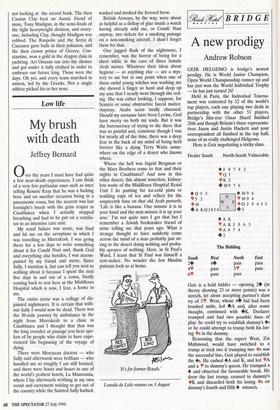Low life
My brush with death
Jeffrey Bernard
Over the years I must have had quite a few near-death experiences. I can think of a very few particular ones such as once telling Ronnie Kray that he was a flicking bore and on another occasion being in a pneumonic coma, but the nearest was last fortnight's brush with the grim reaper in Casablanca when I actually stopped breathing and had to be put on a ventila- tor in an intensive care unit.
My renal failure was acute, was final and hit me on the aeroplane in which I was travelling to Marrakesh. I was going there for a few days to write something about it for Conde Nast and, thank God and everything else besides, I was accom- panied by my friend and nurse, Sister Sally. I mention it, but can tell you next to nothing about it because I spent the next five days in and out of a coma, finally coming back to rest here at the Middlesex Hospital which is now, I fear, a home to me.
The entire scene was a collage of dis- jointed nightmares. It is certain that with- out Sally I would now be dead. There was the 30-mile journey by ambulance in the night from Marrakesh to a clinic in Casablanca and I thought that that was the long corridor or passage you hear spo- ken of by people who claim to have expe- rienced the beginning of the voyage of dying.
There were Moroccan doctors — who Sally said afterwards were brilliant — who handled me so roughly I am still bruised, and there were hours and hours in one of the world's poshest hotels, La Mamounia, where I lay afterwards writhing in my own vomit and excrement waiting to get out of the country while the Sainted Sally bathed, washed and stroked the fevered brow.
British Airways, by the way, were about as helpful as a dollop of glue inside a watch having already sold me, or Conde Nast anyway, two tickets for a smoking passage on a non-smoking aircraft. I shan't forget them for that.
One jagged flash of the nightmare, I remember, was the horror of being for a short while in the care of three female Arab, nurses. Whatever their ideas about hygiene — or anything else — are a mys- tery to me but at one point when one of these awful young witches was washing me she shoved i finger so hard and deep up soy arse that I nearly went through the ceil- ing. She was either looking, I suppose, for Semtex or some obstructive faecal matter. -Anyway, Arabs seem anally obsessed. Should my surname have been Levine, God have mercy on both my souls. But it was the bureaucracy of trying to die there that was so painful and, comatose though I was for nearly all of the time, there was a deep fear in the back of my mind of being held forever like a dying Terry Waite some- where on the edge of a desert who knows where.
Where the hell was Ingrid Bergman or the Marx Brothers come to that and their nights in Casablanca? And now in this other desert, this almost waterless, kidney- less waste of the Middlesex Hospital Renal Unit I lie panting for ice-cold pints or scalding cups of tea and reflect for the umpteenth time on that old Arab proverb, `Life is like a banana. One minute it is in your hand and the next minute it is up your arse.' I'm not quite sure I get that but I remember a Jewish bookmaker friend of mine telling me that years ago. What a strange thought to have suddenly come across the mind of a man probably just sit- ting in the desert doing nothing and proba- bly apropos of nothing. Here, in St Paul's Ward, I learn that St Paul was himself a tent-maker. No wonder the few Muslim patients look so at home.
It's for former Royals.'
Leanda de Lisle returns on 3 August


























































 Previous page
Previous page